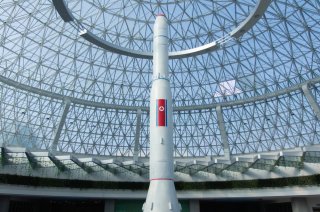North Korea and Donald Trump, Round II: What Could Happen?
A second Trump administration may be in a good position to negotiate a nuclear deal with North Korea.
Donald Trump, along with Russian president Vladimir Putin, is arguably among the world’s most demonized leaders. It is, therefore, an audacious task to defend his record in any part of the world. Yet, in North Korea, it is challenging to find anything that appeared less promising during Trump’s presidency compared to the current situation. Thus, in many ways, Trump’s presidency could be a better option than its alternatives.
Trump’s summit diplomacy with Kim Jong-un showed promise and achieved tangible positive results between the two Koreas. The Comprehensive Military Agreement of October 2018 between North and South still enhances crisis stability on the Korean Peninsula. The series of top-level meetings among leaders of North and South Korea and the U.S. during Trump’s presidency represented the last attempts to foster enough confidence between North Korea and the U.S. to enable the former to feel secure without nuclear weapons. However, that is all in the past. North Korea now possesses the capability to strike the United States with nuclear weapons, and the escalation of tension has solidified North Korea’s self-identity as a permanent nuclear weapons state.
While the current South Korean and U.S. administrations solely engage with North Korea through threats and demonstrative actions, there is an urgent need for negotiations to avert the risk of war. With North Korea’s newfound capacity to strike the U.S. mainland with nuclear weapons, the credibility of U.S. extended deterrence might be diminishing. Deterrence, as per theories of rationality by Reinhart Selten, is flawless only if all its essential moves are credible. The action the United States would need to contemplate, potentially sacrificing Honolulu and Los Angeles and their populations for the defense of South Korea, might not necessarily appear credible to Kim Jong-un if North Korea had a nuclear warfighting capability to overpower or coerce South Korea.
Consequently, both South and North Korea should be inclined to negotiate to prevent further escalation of tension between the countries. Avoiding North Korea’s nuclear warfighting capacity and the costly American nuclear militarization of South Korea would be mutually beneficial. However, the current U.S. government perceives North Korea’s actions solely as reflections of its malevolent character. Consequently, it is unable to engage in negotiations with North Korea. Compromising with North Korea would be seen as appeasement, and given North Korea’s operation based on its malevolent traits, it might not yield any results.
For Trump, the businessman, the world revolves around personal relationships rather than the ideological or institutional characteristics of states. In his world, trade is driven by incentives and offers, not the nature of buyers or business partners. Furthermore, the business world aims for mutual benefits rather than endless punishments and isolation. Consequently, as president, Trump emphasized the importance of “getting along with” countries that could threaten U.S. security.
Establishing rapport with North Korea to negotiate mutually beneficial ways to avoid a situation where Pyongyang develops a nuclear warfighting capacity capable of coercing Seoul within a strategic stalemate with Washington so that South Korea would not require U.S. tactical nuclear weapons and nuclear warfighting capacity on the Korean peninsula, is something that high-level negotiations could achieve. This could decrease nuclear crisis stability and reduce accidental nuclear wars, resulting in massive destruction for all parties. Moralistic interventionism is no longer effective now that North Korea possesses nuclear capabilities to threaten Americans. Simultaneously, the rigid isolation of North Korea due to its nuclear weapons program is also not productive. Given that the situation is escalating in a more threatening direction, there is a need to foster a positive relationship with North Korea to negotiate some mutually beneficial “deals” so that all parties can emerge as winners.
Timo Kivimäki is a Professor of International Relations at the University of Bath & Senior Non-Resident Fellow at the Sejong Institute, Seoul.
Image: Shutterstock.com.

